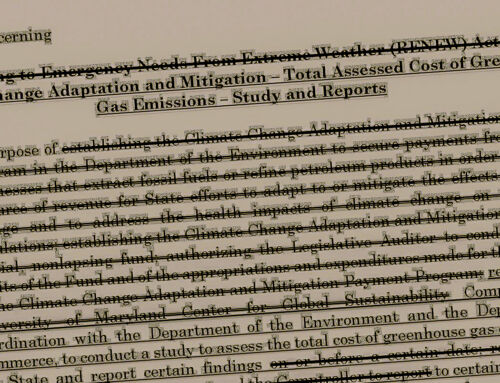View by Topic
Recent Articles
-
EPA Will Keep Current Limits for “Forever Chemicals” in Drinking WaterSaturday, May 24th, 2025
-
Court Indefinitely Pauses SEC Climate Rule LitigationSaturday, May 17th, 2025
-
Maryland is About to Regulate Mold But is the Cart Before the HorseSaturday, May 10th, 2025
-
New Environmental Laws from the 2025 Maryland Legislative SessionSaturday, April 26th, 2025
View by Month/Year
“Green Building Law Update” Headlines
Recent Articles & News from
Stuart Kaplow’s blog
at GreenBuildingLawUpdate.com
- EPA Will Keep Current Limits for “Forever Chemicals” in Drinking Water May 25, 2025
- Court Indefinitely Pauses SEC Climate Rule Litigation May 18, 2025
- Maryland is About to Regulate Mold: But is the Cart Before the Horse? May 11, 2025
- BEPS Redux: The Most Far Reaching Environmental Legislation of the 2025 Maryland General Assembly May 4, 2025
Subscribe to the Green Building Law Update!
Stuart Kaplow brings his expertise and extensive experience to the table with his unique digital publication, "Green Building Law Update". Subscribers receive regular updates to keep them informed about important issues surrounding Environmental Law, Green Building & Real Estate Law, as well as the emerging demand for Environmental Social Governance (ESG).
Get fresh content through the lense of Stuart Kaplow's cutting-edge expertise, innovative commentary and insider perspective. Don't miss another issue! Subscribe below.

We Need to do Better to Reduce Food Waste
More than one third of the food produced in the United States is never eaten, wasting not only the food itself but also the resources used to produce it, creating a multitude of environmental externalities.
Food waste is the single most common material landfilled in the U.S., comprising almost 25% of landfilled solid waste and of note, resulting in more than 14% of total methane emissions.
The more than 133 billion pounds of wasted food annually, worth more than $160 billion, presents opportunities to increase food security, promote resource and energy conservation, and reduce greenhouse gas emissions.
The U.S. Department of Agriculture has recently reiterated that even if fossil fuel emissions were halted, our food system would prevent the achievement of the country’s stated GHG emission goals. Globally, food loss and waste represent between 8 – 10% of anthropogenic GHG emissions (4.4 gigatons of CO2e annually), offering an opportunity for meaningful reductions.
Reducing food waste can also help feed the world’s growing population. The world population is predicted to reach 8.5 billion by 2030. That population increase will require a dramatic increase in food. Decreasing food waste can lessen the need for new food production. In 2015, the United States announced a goal to halve U.S. food waste by 2030, but the nation has not yet made any significant progress.
This uneaten food results in a “waste” of resources, including agricultural land, water, pesticides, fertilizers, and energy; and, the generation of environmental impacts, including GHG emissions, consumption, and degradation of water quality, water scarcity, loss of biodiversity, loss of forested areas, degradation of soil quality and air quality. Each year, food waste in the U.S. embodies:
- 9 trillion gallons of water (equal to the annual water use of 50 million American homes);
- 778 million pounds of pesticides;
- 14 billion pounds of fertilizer (enough to grow all the plant based foods produced each year in the U.S. for domestic consumption);
- 664 billion kWh of energy (enough to power more than 50 million U.S. homes for a year); and
- 170 million MTCO2e GHG emissions (not even including landfill emissions, equal to the annual CO2 emissions of 42 coal fired power plants).
Of considerable importance, this uneaten food also contains enough calories to feed more than 150 million people each year, far more than the 35 million estimated food insecure Americans. That more than 10% of U. S. households are food insecure should not be tolerated in the richest nation in the world and that was before March 1, when the pandemic era SNAP benefit is cut by at least $82 a month per person. Note that these Department of Agriculture estimates are conservative in comparison with other published studies.
The connection between food waste and climate change is increasingly recognized as important and this is a subset of organic material waste (e.g., yard waste) that only exacerbates solid waste landfill problems. Governments across the U.S. have failed to address these matters in any meaningful way despite that California has since last year required residents to separate food waste for curbside pickup and Maryland has mandated large businesses divert food residuals, neither of these nor any other similar laws we are aware of have moved the needle. Last year’s Maryland Climate Solutions Act of 2022 (Senate Bill 528) requires that sites be identified on state land for composting facilities before October 1, 2023.
We need to reduce the impacts of wasted food by composting in homes and businesses recycling organic materials into a nutrient rich soil amendment or mulch through natural decomposition. How does this not make sense?
But if all of that is not compelling enough, if we look beyond the very American term of food insecurity in the U.S., more than 50 million children under age five across the globe suffer from “wasting,” meaning they are below typical height and weight because they are literally starving. How dare we?!
And the problem is not new; how many of us grew up being told to be a member of “the clean plate club” because children in Biafra were starving? Many of our grandmothers composted egg shells and banana peals with leaves and sticks they gathered, but not our generation.
Yes, a broad mix of players are needed to solve today’s food challenges and business can do that including the ever increasing number of companies that believe profit should come not from creating the planet’s problems, but from solving them. We need to do better to reduce food waste.
Drafted in part with ChatGPT









